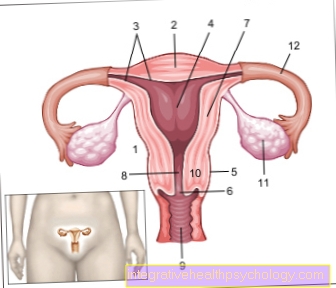Exercise during pregnancy
introduction
Nowadays, women are advised to exercise regularly during pregnancy, as long as the pregnancy is uncomplicated.
Which sports are allowed and how intensively you can train differs from person to person. It depends on how much sport was done before pregnancy, i.e. how well each individual is in training. If in doubt, the gynecologist or midwife should be asked for advice.
You might also be interested in: Pregnancy gymnastics

What is allowed during pregnancy?
In general, everything is allowed that is fun and does not overwhelm the pregnant woman. Suitable sports are:
- to jog
- Walking
- To go biking
- Swimming - Swimming is most recommended as it is easy on the joints
- Yoga in Pregnancy
- Pilates
- Strength training
Read more about this under: Strength training for women, yoga for pregnant women
From the 20th week of pregnancy, the straight abdominal muscles should no longer be trained, but the oblique and lateral abdominal muscles can be strengthened further. Women who were already active in sport before pregnancy can usually do their sport as intensely as before without hesitation.
However, there are also sports that a woman should avoid during pregnancy. These include:
- Martial arts
- skiing
- horse riding
- in-line skating
- extreme loads.
Exercise in extreme heat, at high altitude, or diving should also be avoided as this could harm the baby. During pregnancy, the pregnancy hormone progestin ensures that joints and ligaments become more flexible and softer. This can lead to twisting your ankle more quickly. Therefore, you should pay attention to sturdy footwear during sports to avoid injuries and falls.
Read more about this under: Abs workout during pregnancy
Benefits of Exercise During Pregnancy
While women used to be discouraged from exercising during pregnancy, it is now recommended because of its many benefits. The following applies: You should only do sports that are fun and not overwhelming. Because training that is too intense and being overwhelmed are not good and can even trigger premature labor. In addition, the woman should only exercise when she is feeling healthy. The gynecologist and midwife can advise on this subject if you have any questions or are unsure.
If the woman is physically active before and during pregnancy, this has advantages before and during the birth:
- On average, a fit pregnant woman will gain less weight during pregnancy; the baby will usually not grow too big or too heavy. This can make the birth easier for the woman.
- In addition, the women suffer less from back pain and water retention.
- Regular exercise also reduces the risk of gestational diabetes and pregnancy depression.
- It is also believed that sporty women can withstand the exertion of childbirth better and require fewer obstetric interventions.
One of the very important tasks during pregnancy is to strengthen the back muscles. Read more about this at: Back training during pregnancy
Disadvantages of exercise during pregnancy
There are hardly any disadvantages that would justify why a woman would not exercise during pregnancy. Even untrained women are now advised to start light sports during pregnancy. The reason is the positive effects such as less tiredness, nausea, depression, water retention and weight gain (see also: Pregnancy depression).
However, the sports should be carried out correctly, as otherwise injuries and very intense loads can lead to excessive demands. Excessive vibrations can lead to a miscarriage, especially at the beginning of pregnancy, as the egg may not be able to implant properly. Excessive training can lead to a lack of oxygen in the mother. As a result, this can lead to insufficient care for the unborn child, which is why high-intensity stress should be avoided. However, the baby is not at risk during a normal training session.
Exercise in the 1st trimester of pregnancy
Often times, women don't realize or even know they are pregnant a few weeks later. Then the previous sport was mostly continued and even carried out with the same or higher intensity. But this is not a cause for concern. As soon as a pregnancy is suspected or determined, a gynecologist should first be consulted. In addition, extreme sports, martial arts and excessive stress should be avoided.
In the first trimester, many women experience typical pregnancy symptoms such as nausea, vomiting and tiredness. We therefore recommend plenty of exercise in the fresh air. But also relaxing sports like yoga and pilates. The sport should be practiced that is fun and increases well-being.
In general, all sports are allowed, except for the sports mentioned above. As the pregnancy progresses, the pregnant woman will automatically adjust and reduce the intensity to the physical conditions. It is important not to increase the intensity of training from the beginning of pregnancy, to take many breaks and to drink enough fluids.
Exercise in the 2nd trimester of pregnancy
In the second trimester, most women no longer have nausea and vomiting. This is usually the ideal time to exercise regularly. For most women, the stomach begins to grow. Which sport the woman chooses is up to her. However, it is advisable to choose a sport that has already been performed or, for the untrained, a sport that is easy to learn even for beginners.
There are special courses for pregnant women, including yoga, Pilates, aqua fitness and pregnancy gymnastics. These courses are often led by midwives or experienced trainers. The correct execution of the exercises is taught and the needs of the individual women are also addressed. In this way, the woman can be sure that she will not do anything wrong during training and not harm the baby. There you also have the opportunity to exchange ideas with other pregnant women and to make friends. The costs for these courses are covered or subsidized by some health insurance companies. Anything that is good for the woman is still allowed in sports.
Exercise in the 3rd trimester of pregnancy
In the third trimester, women usually find the growing belly and the additional weight a problem. The woman should no longer strain herself too much and should not train too intensively. Excessive stress can trigger premature labor and thus premature birth. It is advisable to take frequent breaks and relaxation exercises. Long walks are also preferable.
In the last trimester of pregnancy, women should also take care not to lie on their back for too long. The abdomen presses on the main artery and reduces the flow of blood to the baby. This can lead to an insufficient supply in the child.
Nevertheless, the pregnant woman can continue to do the sport that she likes best and does best until shortly before giving birth. It is advisable to practice outdoor sports with a training partner. Help can be called in the event of an injury or an accident.
Are there any specific exercises that can help me with childbirth?
If the woman has been physically active during pregnancy and is physically fit, this can have positive effects on the birth and the time afterwards.
- Sports that train endurance. lead to the fact that the woman is generally more productive and can better endure the birth process. It has been shown that women who have given birth can cope with the pain better than women who have not exercised. They also needed less pain medication during childbirth.
- Sports and exercises that train the pelvic floor or the pelvic floor muscles are also suitable. You can do these exercises yourself at home. Trained pelvic floor muscles help women better control the birth. It has also been shown that women usually have a good body image and can help more during childbirth. A trained pelvic floor is beneficial after the birth because it reduces the risk of later incontinence and promotes regression after the birth.
- There are also yoga and Pilates classes for pregnant women. There, pelvic floor and relaxation exercises are performed which can be helpful during childbirth. In a birth preparation course, the midwife teaches breathing techniques that lead to relaxation during the birth and make the pain easier to bear.
You might also be interested in the following articles: Pelvic floor exercises, physiotherapy during pregnancy, exercises for the cervix during pregnancy
Can I go to the gym?
Exercise in the gym is allowed during pregnancy. It doesn't matter whether the strengthening exercises are performed on the machine in the gym or with the dumbbells at home. However, it is not recommended for women to begin weight training equipment during pregnancy if they have not done so prior to pregnancy. The stress would be too intense and unusual for the pregnant woman. However, light strengthening exercises and endurance sports are suitable for everyone and, if done correctly, can be carried out without hesitation.
Trained women can continue to do weight training as usual, but the intensity should not be increased any more and should be adapted or reduced to the physical conditions during pregnancy.
From the 20th week of pregnancy, the straight abdominal muscles should no longer be actively trained. The oblique abdominal muscles, on the other hand, can be trained until the end of pregnancy. If you have any doubts which exercises may still be performed, the midwife or gynecologist should be asked for advice.
It is important to ensure that you do the exercises correctly during training in order to avoid injuries. In addition, it is important to ensure adequate fluid intake during exercise.
Which sports are dangerous during pregnancy?
A woman should avoid some sports during pregnancy.
- Excessive and intense loads should no longer be carried out. The woman should be able to have a good conversation during the sport and not get too out of breath. This can serve as a guideline for the individual exposure limit. In addition, regular breaks should be taken and sufficient fluid intake should be ensured during training.
- In the first trimester of pregnancy (1st trimester) sports that involve a lot of jumping should be avoided. Due to the vibration, there is a risk that the egg will not be able to implant properly. It could lead to a miscarriage.
- Martial arts and sports where there is a risk of falling should be avoided throughout pregnancy. These include inline skating, ice skating, climbing, skiing and horse riding.
- Sports at extreme heights and depths, such as diving, can also harm the unborn baby.
- It is the same with exercise in extreme heat.
In general, women should concentrate on exercising and exercising during pregnancy. Because the hormones ensure that the ligaments are stretched. The risk of twisting an ankle and the risk of injury are thus increased.
How high can the pulse go during sport?
Endurance sport also has positive effects on the body and typical pregnancy symptoms during pregnancy. However, care should be taken during training that the pregnant woman does not put too much strain on herself. Because excessive demands can have negative effects and do the opposite.
Younger women are allowed to train in a pulse range of 135 to 150 beats per minute. Women over 30 should exercise a little less stress and should not exceed a heart rate of 145.
However, it has proven to be more effective that women should listen to their gut feeling during training instead of using a heart rate monitor. As long as the pregnant woman can talk during training, the intensity of the load is correctly selected.
The following article could also be of interest to you: Complications during childbirth
How long is cross trainer allowed?
Endurance training is recommended during pregnancy. Exercising on the cross trainer and endurance sports in general is permitted throughout pregnancy. Of course, only as long as the woman feels healthy and fit. The intensity and duration of the training should, however, be reduced somewhat in the course of pregnancy. In order to avoid overexertion, the woman should be able to talk to herself during training.
Towards the end of pregnancy, exercising on the elliptical machine is preferable to jogging outdoors. The risk of kinking and falling is lower on the cross trainer.
You might also be interested in: Skin changes during pregnancy
How long can I jog?
Jogging is allowed during the entire pregnancy until shortly before the birth. The duration of the training and the speed should be reduced in the course of pregnancy and in no case increased. For women who only want to start jogging during pregnancy, it is advisable to take short breaks from time to time. You should only train so intensively that the woman can still talk to her training partner while running. It is important to pay attention to suitable running shoes in order to bend over and avoid injuries.
Jogging on uneven terrain such as forests is not recommended due to the increased risk of falling during pregnancy. The pregnant woman should also refrain from jogging when it is too hot or cold. This could harm the unborn baby.
Read more about this: Jogging





























